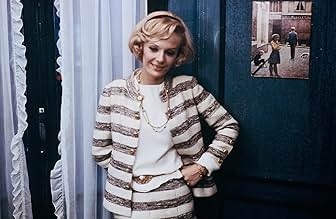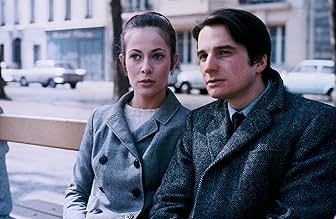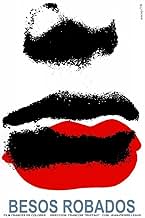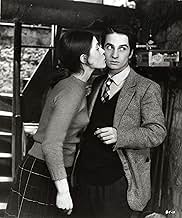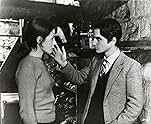Adicionar um enredo no seu idiomaAfter being discharged from the army, Antoine Doinel centers a screwball comedy where he applies for different jobs and tries to make sense of his relationships with women.After being discharged from the army, Antoine Doinel centers a screwball comedy where he applies for different jobs and tries to make sense of his relationships with women.After being discharged from the army, Antoine Doinel centers a screwball comedy where he applies for different jobs and tries to make sense of his relationships with women.
- Direção
- Roteiristas
- Artistas
- Indicado a 1 Oscar
- 5 vitórias e 7 indicações no total
- Georges Tabard
- (as Michel Lonsdale)
- Albani
- (as Simono)
- Albert Tazzi
- (não creditado)
- Une vendeuse du magasin de chaussures
- (não creditado)
Avaliações em destaque
Standing by itself, Stolen Kisses is a terrific film about a mediocrity. Antoine can't hold a job, and he can't even hold a woman. He kisses his girlfriend as he would kiss a prostitute - awkward and rough. Upon meeting a private detective (modeled after Andre Bazin - Truffaut's mentor), Antoine gets a job spying on the workers of a shoe store owner who claims everyone hates him. There, he falls into lust with the bosses high-society wife.
At the end of the film, Antoine is forced to compromise and marry his old girlfriend for whom he may or may not feel any true love. The point is that she is there to support him and love him. He is the elevated statue of desire to her just as the shoe store owner's wife was to him.
All in all, this movie is exceedingly well done by the Great Truffaut, but I just couldn't get past the fact that Antoine was the same boy I last saw escaping from a juvenille hall and running to the ocean in a moment of personal victory from a society that didn't really want him. Something in this film did not match up with the previous one.
As Christine, Claude Jade is as cute as a button and her scenes are often the most charming ones in the film. Her introductory scene, stepping out of the Parisian night appearing like an angel to wave shyly at Antoine through a glass wall, is a delight. Later, Christine attempts to guess Antoine's latest job, amusingly tossing out way-off-the-mark guesses like cab driver or water taster. It is a ticklish scene but also hints that Christine, as of yet, doesn't think so highly of Antoine's employable skills. By the film's end, Antoine has become a TV repairman. He has been holding a grudge against Christine, so she wins him back in a fetching manner. She calls his company for service even as she is removing a component from her TV. The company sends Antoine, who is then forced to stay for hours trying to fix an irreparable TV.
The best romantic scene in the film, however, is a quaint breakfast scene one morning in Christine's kitchen. Christine is busy teaching Antoine how to butter toast. Antoine, for his part, wishes to pose a question to her. Too embarrassed to express himself in words, he writes his question on a notepad instead and hands it to her. She immediately writes her reply and hands it back to him. They continue in this manner for a few more exchanges before Antoine withdraws a scissor from a nearby drawer and hangs it on Christine's ring finger. It is a touching and intimate moment between the two young lovers and communicates, without intrusive words, their affection for one another.
Antoine finds a job as a night porter in a hotel in Paris, thanks to Christine's father's recommendation, a comely Christine visits him one night, she greets him on the new job and seems casually happy but not so enthusiastic. Soon he is fired for being an unwitting helper of a private detective Henri (Harry-Max), who instead introduces him to the new exciting line of business managed by Monsieur Blady (Falcon). Antoine starts his new vocation with great passion although his stalking skill is a far cry from professional. Truffaut's perspicacious insight of urban savvy is brought to the fore in this segment, mainly surrounding two cases, a subtle love triangle about a (closeted) man looking for his magician lover and a more detailed inside-job, where Antoine is assigned to undercover in a shoe shop owned by Georges Tabard (Lonsdale, a great scene-stealer), who wants the agency to find out why he is so disliked by everyone around him, but the irony is that during Georges' loquacious introduction of his background, the reason behind that is pretty crystal-clear. During the course, Antoine is hopelessly having a crush with Georges' wife Fabienne (Seyrig, enigmatic and fabulously seductive), the apotheosis of a woman's sheer perfection. He is torn between his unquenchable fascination to Fabienne and the on-and-off relationship with Christine, which extracts the most vehement outburst in the mirror scenes where Antoine's unfitting characteristic is pungently reflected, with the iterations of self-persuasion and self-boost, to no avail. Eventually after tasting the temptation, which costs him the second job, he reconciles with Christine in the cutesy chapter where he works as a TV repairman, but the uncertainty of his own feelings becomes more pronounced in the coda, where a stalker makes a wanton confession to Christine in the presence of Antoine, both dismiss at him on the spot, but think twice, it is the capriciousness of love and emotions that will certainly puzzle Antoine, and trigger every viewer, to discover what will happen to him and Christine later, aka. in BED & BOARD (1970), approximately after a two-years spell.
STOLEN KISSES is charming in its carefree tempo and disarming in its frankness about whimsical triviality, it is not a major or challenging piece of work from Truffaut, but still scintillates with the profundity of a intelligent life-observer, an obliging humorist and an inspiring filmmaker.
"Baisers Volés" is a delightful romantic comedy of François Truffault. Using his alter-ego, Antoine Doinel, this movie pictures the romantic and very funny adventures of this character in Paris with prostitutes, with his girlfriend and with his married passion. The soundtrack, with song "Que reste-t-il de nos amours?" of Léo Chauliac, is simply wonderful. This classic story is still charming and not dated almost forty years later. My vote is eight.
Title (Brazil): "Beijos Roubados" ("Stolen Kisses")
Você sabia?
- CuriosidadesThe original French title of the film comes from a line in Charles Trenet's song "Que reste-t-il de nos amours?" which is also used as the film's signature tune.
- Erros de gravaçãoWhen talking with Madame Carbon, Antoine is preparing a piece of cheese with mustard, but after the cut to a different angle, he is holding his glass of wine instead.
- Citações
Georges Tabard: Do you speak English, Antoine?
Antoine Doinel: I'm learning from records, but it's not easy.
Georges Tabard: Records are a joke. There's only one way to learn: in bed with an English girl. It's time you learned. I learned with an Australian girl while her husband was at work painting houses.
Fabienne Tabard: Like Hitler.
Georges Tabard: Don't ever say Hitler was a housepainter. That's slander. Hitler painted landscapes.
- Cenas durante ou pós-créditosInstead of including "The lily in the valley" by Honoré de Balzac in the writing credits, François Truffaut shows the main character reading a book with a cover that says '"The lily in the valley" by Honoré de Balzac'.
- ConexõesFeatured in Introduction to Truffaut Season (1972)
- Trilhas sonorasQue Reste-t-il de nos Amours ?
Music by Charles Trenet and Léo Chauliac
Lyrics by Charles Trenet
Performed by Charles Trenet
Principais escolhas
- How long is Stolen Kisses?Fornecido pela Alexa
Detalhes
- Data de lançamento
- País de origem
- Central de atendimento oficial
- Idiomas
- Também conhecido como
- Beijos Roubados
- Locações de filme
- 15 Rue de Steinkerque, Paris 18, Paris, França(exteriors: Antoine's apartment facing Sacré Coeur)
- Empresas de produção
- Consulte mais créditos da empresa na IMDbPro
Bilheteria
- Orçamento
- US$ 350.000 (estimativa)
- Faturamento bruto nos EUA e Canadá
- US$ 509
- Fim de semana de estreia nos EUA e Canadá
- US$ 11.206
- 25 de abr. de 1999
- Faturamento bruto mundial
- US$ 509
- Tempo de duração1 hora 31 minutos
- Mixagem de som
- Proporção
- 1.66 : 1
Contribua para esta página


![Assistir a Bande-annonce [OV]](https://m.media-amazon.com/images/M/MV5BMDA4YTUxMjAtMDMwNi00MWY1LTllZTgtZTQzZjRlMjE1NWEwXkEyXkFqcGdeQXRyYW5zY29kZS13b3JrZmxvdw@@._V1_QL75_UX500_CR0)
